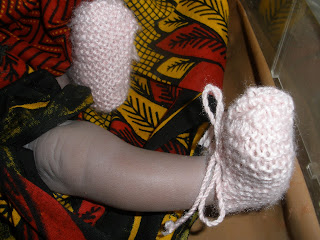The next day we set off back to the village hospitals to do some teaching (see pic of a labour ward at one of them below). I went to the maternity section to do some ‘teaching on the run’ - in neonatal resuscitation and shoulder dystocia management. Whilst teaching neonatal resus 2 women were in labour.
It is typical for no observations to be performed during or after labour - no one listens to the baby’s heart beat or checks the mothers blood pressure/pulse. Most of the time you don’t really have any idea what gestation (weeks pregnant) the baby is and nearly all the time there is meconium stained waters (baby has had a poo before birth and water goes green/brown). For this and many other reasons many babies are born and require resuscitation. I therefore used the opportunity to my advantage and went in and assisted with the birth. The baby (as I suspected) was born in very poor condition. I talked the nurse through the resus procedure which I had just been teaching her and we worked together to resus the baby. It took a while but the baby finally starting breathing on it’s own. It was amazing to teach in real life and know that you have possibly helped save a baby’s life. I am unsure if I had not been there what they would have done, as they seemed no hurry to act on the very obvious signs of this baby requiring resus - nothing is a hurry over here! This is one of the babies I helped resus.
The other women was HIV positive, she was in labour with her first baby and was very distressed and scared. She looked about 17 years old. HIV is very common here I have been told the figures are anything from 10-70% and apparently higher in the villages. I have learnt a lot about HIV management and drug therapy in pregnancy, labour and after birth and have met more HIV positive women and babies in four weeks than I have or ever will in my career. The next day when I returned this women had birthed a beautiful baby girl. I gave her a hat and some clothes and congratulated her.
Tonite we are planning a small party for some of the locals at the accommodation we are staying at. Our food usually consists of rice and spinach, tonite they are cooking a special meal! Hmmm… I will let you know how that goes.
Cherish your life and your children, because no mater the difficulties we face at home we have to be thank full for the awesome health care and access to drugs/experience medical professionals we are all so lucky to have, compared to here. I know several of you who know this all to well. xx




No comments:
Post a Comment